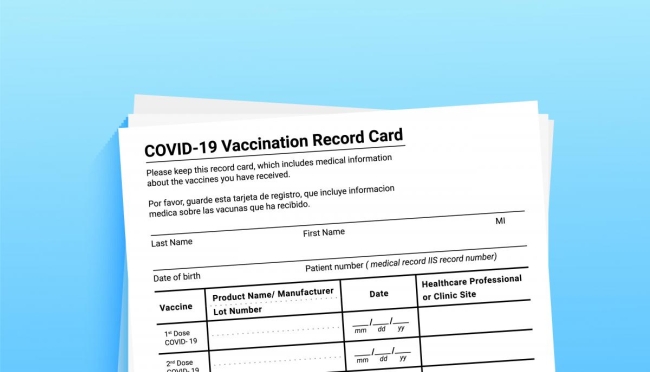You have /5 articles left.
Sign up for a free account or log in.

Irina Shatilova/iStock/Getty Images Plus
With the fall semester approaching, the much more easily transmissible Delta variant of the coronavirus spreading, and COVID-19 cases rising, professors and students at several flagship public universities are pushing their institutions to join the more than 600 other colleges and universities that are mandating vaccines.
Dimitri Drekonja, an associate professor of medicine at the University of Minnesota-Twin Cities, co-authored an open letter in June signed by more than 500 people calling on the university to reconsider its decision not to require vaccines.
"At this point they're getting to be more and more of an outlier," said Drekonja, who noted that the top 25 leading institutions in the country are all requiring vaccines. "I think when you see all your peer institutions go in one direction and you're not, at some point it makes you reconsider."
The American Association of University Professors chapter at the Twin Cities campus held a faculty forum last week focused on the university's COVID-19 protocols, including the lack of vaccine requirements for employees and students and the decision to reinstate an indoor mask mandate. The executive board said in a statement that the discussion at the forum was reflective of "the broad frustration and deep anger among faculty at Twin Cities that has been building over the summer about the unsafe reopening policies put forward by the administration. The general sentiment among faculty at the meeting is that there must be a multidimensional approach to the issue of health and safety for faculty, students and staff, especially in the context of the rising Delta variant of the virus. This approach should include vaccine and mask mandates with provisions for dealing with necessary exceptions."
University of Minnesota President Joan Gabel explained the decision not to mandate vaccines in a June announcement and said the institution is "putting the full weight of the University behind access to vaccines and information about the benefits of vaccination. Public health experts note that a 100 percent vaccination rate is not possible in any situation and the most effective strategy is access and information."
The open letter by Drekonja and colleagues argued this logic was flawed, in that vaccine mandates can and do impact vaccination rates.
"The U has a simple method to increase vaccination coverage," the letter states. "It should use it."
As the Delta variant has spread across the country in recent weeks, there has been an acceleration in colleges announcing COVID-19 vaccine mandates.
The University of St. Thomas, a Roman Catholic college in Minneapolis, announced a COVID-19 vaccine requirement last week for all faculty, students and staff, saying the decision was "due to the highly contagious delta variant spreading rapidly and rising infection rates in Minnesota and beyond."
The College of Saint Benedict and Saint John's University, two other Minnesota Catholic colleges that operate cooperatively, also cited rising infection rates and the spread of the Delta variant in announcing a new COVID-19 vaccine requirement last week.
Half of the University of Minnesota's peer universities in the Big 10 have mandated COVID-19 vaccines, including the Universities of Illinois, Indiana, Maryland and Michigan, as well as Michigan State, Northwestern and Rutgers. A federal appeals court upheld the legality of Indiana University's vaccination requirement in a ruling last week.
Another Big 10 peer, Pennsylvania State University, has opted against requiring vaccines in favor of incentivizing vaccination and imposing additional COVID-19 testing requirements for unvaccinated individuals. Other Big 10 universities that are encouraging but not requiring COVID-19 vaccines are Ohio State and Purdue Universities, and the Universities of Iowa, Nebraska and Wisconsin-Madison.
Meanwhile, at the University of North Carolina, Chapel Hill, the Faculty Executive Association unanimously approved a resolution last week calling on the University of North Carolina system to give the Chapel Hill chancellor and president the authority to require students and employees to provide proof of vaccination. Members passed the resolution at the conclusion of a special meeting called to address coronavirus safety this fall.
"I think we need every tool at our disposal as we're addressing the Delta variant," Kurt Ribisl, professor and chair in the Department of Health Behavior at the UNC Gillings School of Global Public Health, said during the meeting. "Things have just dramatically changed."
Norma Houston, chief of staff of the UNC System Office, said that all UNC campuses "will operate under a 'Get Vaccinated or Get Tested Weekly' requirement for students. Universities are collecting information on students' vaccination status, and any unvaccinated students will be subject to weekly, or more frequent, testing."
UNC System President Peter Hans also sent guidance to campus chancellors on Friday directing them to similarly require employees to either get vaccinated or undergo regular COVID-testing.
"I think it's reasonable, both for public health and for leadership by example, to ask our faculty and staff to comply with the same protective measures we are asking of our students," Hans wrote in a memo to chancellors.
There are stark differences across the country in terms of the types of institutions requiring vaccines: generally speaking, private colleges are more likely to require them than public ones, and universities in Democratic-leaning states are more likely to require them than Republican-leaning states. Many Republican-controlled states have laws or executive orders in effect that prevent public colleges from requiring COVID-19 vaccines and, in some cases, from putting in place other public health measures such as mandatory masking.
A new national poll from Quinnipiac University released last week found that Americans are split nearly evenly in whether they support university vaccine mandates, with 48 percent in support and 49 percent in opposition.








